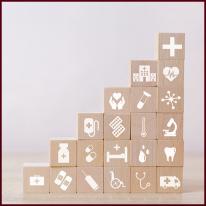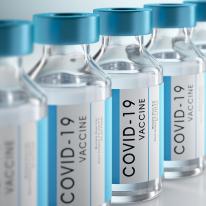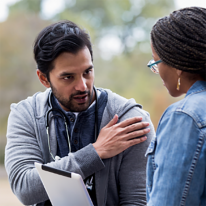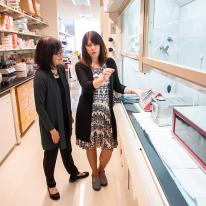Hundreds of people died recently in a heatwave in the Pacific Northwest, higher levels of air pollution have been correlated with increased incidence of Alzheimer’s disease, and extremes of flooding and drought impact food production. These are just a few of the ways climate change is affecting human health.
Of particular concern is that these environmental changes disproportionately impact the least wealthy and most vulnerable across the planet, increasing existing inequities in health. This is why we have dedicated faculty, staff, and students across the health sciences who are committed to finding ways to help our planet, as well as heal people. It is in our power to make the kind of changes that can help.
One example is the work of our interdisciplinary health science Climate Champions Team, led by Teddie Potter of the School of Nursing. This team has created climate-focused slide sets that can be easily incorporated into existing curriculum. The slides show the connection between climate change and health, as well as introduce strategies and resources to help both patients and the Earth.
It is critical that we prepare the next generation of health science providers for the challenges they will face, whether it is asthma patients impacted by the lengthening pollen season in Minnesota, animals sickened by new pathogens introduced by species displaced from their normal geographic ranges, or the multitude of problems on a global level.
Thank you,
Jakub Tolar, MD, PhD
Vice President for Clinical Affairs


Health Discovery Hub
The Office of Academic Clinical Affairs hosted a forum and discussion of the proposed Health Discovery Hub, a new clinical research facility that is being re-imagined based on the University's experience with research conducted during the COVID pandemic. The presentation was led by Medical School Vice Dean for Research Tim Schacker, MD, and University Architect and Design Manager Marc Partridge with more than 150 participants who posed several dozen questions about the planning to occur. As planned, this new building will adjoin the M Health Fairview Clinics and Surgery Center at Fulton and Oak Street S.E. A dedicated building for clinical research is the second of the two buildings recommended by a Minnesota Blue Ribbon commission in 2015. The first, the Health Sciences Education Center, was completed and opened in 2020.

New UMN Program Putting a Spin on Teaching About Cancer and Cancer Research
A new program led by the Masonic Cancer Center and the U’s Medical School Program in Health Disparities Research aims to attract a diverse cadre of students to the fields of biomedical and behavioral science cancer research. The MN Advancing Science, Enhancing Diversity (M-ASCEND) program, which launched earlier this year with funding from a National Cancer Institute R25 grant, recruits high school and college undergraduate students to a program that engages them in the science of cancer and its prevention while introducing them to career development skills and career opportunities in the field.


New Home for Interprofessional Education Across Health Professions Program

Interprofessional Student Training on Administering COVID Vaccines
This past spring 146 health sciences students from the Duluth and Twin Cities campuses completed the new online interprofessional training, “COVID-19 Vaccine and Pandemic Planning.” The six-week course covered topics like COVID-19 and the COVID-19 vaccines, and the public health role in pandemics using a mix of recorded presentations, readings, interprofessional discussions, and journaling.


Community Health Connections
University researchers partnering with community organizations, or seeking community partners are eligible for Clinical & Translational Science Institute’s Community Health Connections Grant, which is intended to help identify community needs and generate ideas, build partnerships, and create opportunities around a broad range of health concerns or questions to improve community health. Next application deadline: July 29.




